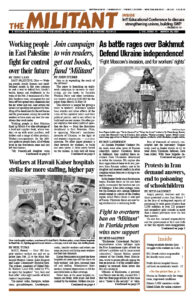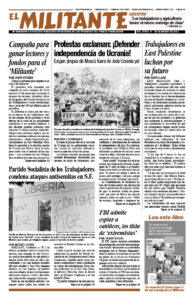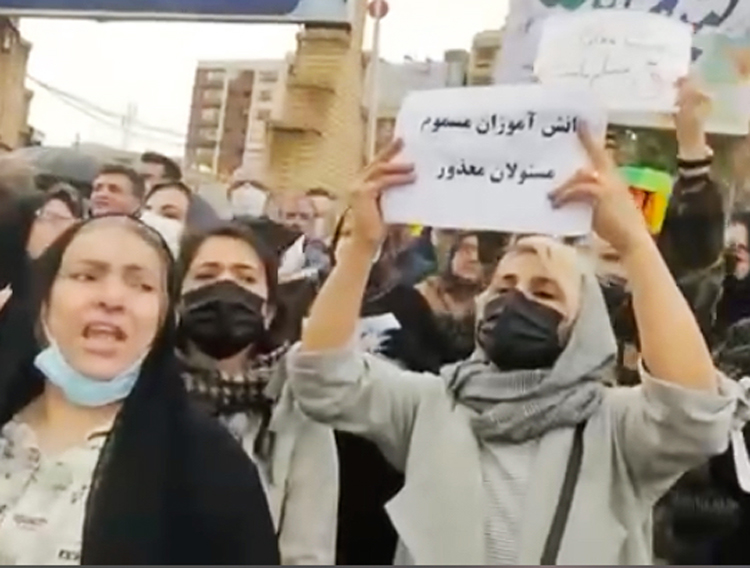Angry parents, teachers and students protested across Iran March 7 in the face of widespread reports of poisoning by toxic gases of more than 1,000 students at over 125 primary and secondary girls schools in more than a dozen provinces over the last four months.
No one has claimed responsibility and the government at first said little or that the reports were exaggerated. Mistrust of the bourgeois-clerical regime — among working people and especially among oppressed nationalities like the Kurds, Baluchs, Azerbaijanis and Arabs — has mushroomed as a result of its brutal attacks on demonstrators protesting the death of Zhina Amini after her arrest by the hated “morality” police last September.
More than 500 protesters were killed by the regime’s thugs and thousands were arrested during several months of demonstrations. The government slandered peaceful protesters as rioters, tortured many of those it arrested and carried out the death penalty against four protesters.
Nonetheless, confidence among working people that they can fight the regime’s assaults has grown and political space has expanded.
Call for independent investigation
Prominent Sunni cleric Maulana Abdul-Hamid — a central leader of the struggle in Sistan-Baluchistan province where weekly protests of thousands continue — spoke for many in Iran when he asked, “What is happening? Why cannot the government reveal the cause of the poisoning of these female students? Who can believe that senior officials do not know what is going on?
“Many believe, and perhaps this is close to the truth, that this incident is suppression of the protests,” he added.
Despite virulent attacks on him in the regime’s press, Abdul-Hamid has been speaking out against the dress code for women; in favor of freedom of speech, the press and of worship; and for an end to the death penalty.
“The perpetrators of student poisoning should know that students are the red line for teachers,” said the Coordinating Council of Iranian Teachers Trade Union in its call for nationwide protests March 7.
The teachers’ union called for the formation of “a committee of independent civil, trade union and political activists, along with a group of doctors, expert professors and human rights lawyers to conduct a comprehensive review of the issue of school poisoning in order to clearly examine the facts and realities. The result should be made known to the people of Iran.”
The union initiated more than 25 actions across the country, which also called on the authorities to halt plans to sell off some school buildings, to release imprisoned teachers and students, and to rehire teachers fired for participating in protests. University students also held protests in several cities.
While many protests took place without problems, some were attacked by police and Revolutionary Guard Corps with tear gas and other weapons, including in Sanandaj in the Kurdish region. In Fars province 12 teachers and seven students and parents were arrested and then released.
Accounts from Tehran indicate that special repressive units occupied the rally area near the Majlis (parliament) building and that some teachers and others who came to protest were arrested. Others who had turned out regrouped in small numbers nearby.
Participants included a teacher who had been fired some years ago for his outspoken views. He said he welcomed the stance taken by Abdul-Hamid in Baluchistan. Two women, both homemakers, commented that this issue is separate from that of compulsory hijab. Whether you have hijab or not, they said, your child’s health and life are in danger.
There were debates among those who turned out over how to conduct themselves at the protest. A small group briefly chanted, “Death to the child-killing regime!” Others thought the political focus should be on demanding that the government take action to stop the attacks and arrest the perpetrators.
In Isfahan an eyewitness reported that a small group gathered in front of the Department of Education there and was attacked by local police and the Special Squads. Some were beaten up and dragged into the building. The teachers still outside warned passersby not to stop and to move on. Motorized units of the Special Squads circled the building and surrounding streets all morning, ordering groups of more than two people to disperse.
Regime’s cynicism
In the face of mounting anger, Dr. Saeed Karimi, vice president of the Ministry of Health, announced March 6 that a committee of 30 scientists and doctors has been investigating the poisoning and is visiting schools that were affected.
Karimi alleged that “less than 10%” of the students were actually sick. The rest of the symptoms he claimed were caused by “anxiety” and “psychological effects.”
Yadullah Javani, a leader of the Islamic Revolutionary Guard Corps —the main tool of the government in attacking peaceful protests — cynically tried to deflect the anger by charging that “behind the scenes of this crime and evil conspiracy to poison the girls are the same 44-year enemies of the Iranian nation” who backed the “Women, life, freedom” protests. The regime claims the U.S. and Israeli governments incited the protests. Javani boasted that the regime is responsible for “success for women” in their “scientific, cultural and social status.”
“Awakening” and other women’s rights groups in Iran have answered that falsehood. “In Iran women fought many years to get the right to education,” they wrote recently, “until finally they were able to achieve this natural right to some extent through the establishment of public schools.”
Iranian Supreme Leader Ayatollah Ali Khamenei stated March 6 that the poisoning is “an unforgivable crime” and it would be “severely punished.”
But the “crime” the regime seems most interested in stamping out is anyone who questions its rule.


